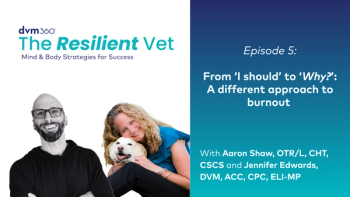
How to take charge of your happiness
You have the power to change your situationand the profession.
Getty ImagesA recently published feature in dvm360 magazine,
Personally, I find that when it comes to job satisfaction and career frustration-despite many of the factors described in the study (income, hours worked, student indebtedness)-individual circumstances are more to blame than inherent flaws in the profession. The net result, however, is often the same: a perceived lack of success, control or power.
Powerful or powerless
“Power” refers to the relationship between people as they try to influence one another. Everyone strives for some degree of power, and feeling powerless leads to feelings of frustration. But this process starts internally as a matter of choice. In every situation, be it personal or professional, we choose whether to be powerless or powerful.
A number of the well-worn books on my shelf were written by Steven Covey and like-minded authors. While some are a bit old, the principles and methods they outline are never out of date. I recommend all of them to you. The Seven Habits of Highly Effective People should be required reading. The Power Principle by Blaine Lee is based on the idea that if you change the principles you live by, you can change your world.
Most unhappy people feel powerless. They've decided that there's nothing they can do about their situation but wring their hands. Nobody likes feeling powerless-but you can either remain in that position or find a way to develop your personal power. It's up to you how you deal with disappointments. Don't give your power away.
I learned this lesson late in my career, partly through the rather insensitively titled Larry Winget book Shut Up, Stop Whining, and Get a Life. For years I believed I was powerless to change my circumstances, even though I wasn't really happy. I wanted to create a change but lacked the personal power to do so. Once I assumed that power, doors opened and lights came on.
If we remain powerless the result is self-doubt. “What will become of me? Did I choose wrongly? Who will rescue me? When will things get better?” The answer: When we change them and make them better.
We need to recognize we are powerful-in fact, we are more powerful than we think. We need to speak to ourselves and identify and pursue our own fulfillment. That may mean making changes we hadn't anticipated, such as relocating for a new position or reinventing ourselves personally and professionally.
Three choices
If we're disappointed in our profession or frustrated by our career choice, it's up to us to recognize that there are really only three ways to deal with it.
1. We can do nothing. We can lead lives of what Henry David Thoreau referred to as “quiet desperation.” We wish things were different but we do nothing to make them so.
2. We can pursue happiness. We can revisit our career choice and be willing to reinvent ourselves if necessary. We can find what we value and love about our lives and simply do more of that-in essence, we can make the most of our reality.
3. We can be the change. We can recognize that the present day of our profession is very different from what most of us anticipated, and the future may be even more unsettling. It's up to us to do what we can to focus on principles of honor and integrity, remember that the whole is stronger than its parts, and make the profession what we want it to be.
As the old saying goes, I can seek “the serenity to accept the things I cannot change, the courage to change the things I can, and the wisdom to know the difference.” I would add that we can seek the power to support others in their search.
Dr. Michael Paul, @mikepauldvm on Twitter, is a nationally known speaker and columnist and the principal of Magpie Veterinary Consulting. He lives in Anguilla in the British West Indies.
Newsletter
From exam room tips to practice management insights, get trusted veterinary news delivered straight to your inbox—subscribe to dvm360.




